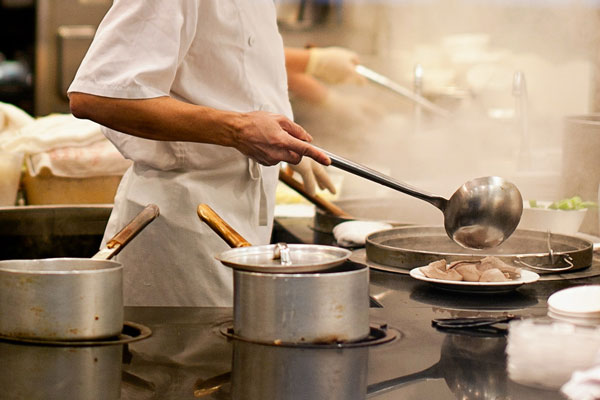Turn your Health Inspector into your Food Safety Ally
For many foodservice operators, keeping up with evolving regulations can feel like chasing a moving target. According to Datassential’s 2025 Midyear Trends Preview Report, more than half of operators (53%) say new food safety regulations are often difficult to understand and implement. That number reflects a reality most in the industry know well: regulations are essential, but they can be complex, time-consuming, and sometimes confusing.
On top of that, most operators agree that managing food safety and maintaining compliance are not only important but also challenging. Between balancing labor shortages, inflationary costs, and escalating consumer demands for speed and innovation, food safety may not always get the time and attention it deserves.
The truth is that food safety should be a constant priority in your operation. I was reminded of this during our late-August food safety inspection for our campus dining operation, which we run as part of a class. Overall, the inspection went well, but it also reinforced the importance of using your health inspector as a resource. As instructors, we were juggling the start of a new semester and preparing for students to flood through the doors. Amid that chaos, it would have been easy to let our food safety plan and procedures slip into the background.
In years past, the inspector was viewed more as an antagonist than an ally. Inspectors themselves have tried to change that perception in the last decade or more. Our interactions with our inspector when they arrived at our facility helped to remind me of this. I believe that inspectors are one of the most underutilized resources available to every operator.
It’s easy to see health inspectors as adversaries; they show up unannounced with their clipboards, or more commonly now, their iPad in hand, ready to cast judgment. And of course, they are there to look for things you and your employees have done wrong. But inspectors aren’t just there to catch problems. At their core, inspectors are public health professionals, trained to help protect communities and prevent foodborne illness. When operators start to view them as partners rather than obstacles, the relationship can shift. Your inspector can become a trusted advisor who helps you navigate regulations, identify risks before they become violations, and build a stronger food safety culture within your business.
With 53% of operators noting regulations are hard to understand, inspectors can help translate that code language into practical advice for you and your employees. If you’re unclear about a new requirement, reach out and ask your inspector for clarification. Engage them in dialogue now so you have a better, more trusting relationship when it comes time for your next inspection.
Regulations are written broadly, but every operation is unique. Whether you run a high-volume quick-service restaurant, a grocery deli, or a school foodservice, inspectors can help tailor compliance strategies to your operation.
Instead of waiting for a formal inspection to identify problems, schedule a consultation or ask questions during routine visits. Many inspectors are happy to point out potential issues and suggest fixes before they become violations that affect your record.
…When inspectors see operators taking initiative, asking questions, and striving for improvement, it sets a positive tone…
This trust can make future inspections smoother and may even create some flexibility when minor issues arise.
If you’re ready to turn your inspector into an ally, here are a few practical steps:
- Shift Your Mindset: Instead of dreading inspections, view them as an opportunity to learn and improve.
- Ask Questions: Don’t be afraid to ask why a regulation exists or how you can best apply it in your operation. Curiosity demonstrates engagement.
- Request Resources: Many health departments provide handouts, checklists, or sample policies you can adapt for your operation.
- Be transparent: If you’re struggling with a requirement, say so. Inspectors appreciate honesty and are more likely to work with you toward a solution.
- Follow Up: If your inspector suggests changes, implement them quickly and share your progress. This shows commitment to food safety.
Foodborne illness outbreaks can devastate a business, not just financially but reputationally. While compliance may feel like another box to check, strong food safety practices protect both your guests and your brand. By using your health inspector as a resource, you gain an extra set of eyes, a deeper understanding of the rules, and a partner in keeping your operation safe.
From an operator’s perspective, commercial refrigerators were more reliably able to maintain 41°F than exactly 40°F. Thus, it is easier for facilities to consistently meet and monitor 41°F. Similarly, hot-holding equipment like steam tables often stabilizes at a holding temperature of 135°F, whereas 140°F is more difficult to achieve.
Thus, the adjustment to the TDA we know today was made because of increased knowledge of pathogen growth, while trying to make the code more practical for foodservice operators to comply with, while not compromising public health.
Understanding and respecting the TDZ is one of the most important responsibilities in foodservice. Make temperature control a daily habit, build a culture of food safety, and invest in the right tools and training to ensure that your operation stays safe, compliant, and trusted. Risk Nothing.
READ MORE POSTS
What is the Greatest Threat to Food Safety?
What is the Greatest Threat to Food Safety?
Food Safety Considerations for the “New Way” of Dining, Part II – Back-of-house
In our first blog this month, we discussed the importance of front-of-house practices as we emerge from the pandemic this summer and into fall. Making your guests feel safe will be an important point as we welcome them back to our establishment. The safer they feel, the more likely they are to revisit and this could, in turn, be a competitive advantage for your business.
Food Safety Considerations for the “New Way” of Dining
Spring is my favorite time of year, as we head out of the winter months, welcome warmer weather, and increase the daylight hours. As such, we turnover a new leaf and welcome new life as our grass, trees, and perennials come out of dormancy. This year as the Coronavirus vaccine continues its roll out and we welcome a third vaccine onto the market this morning, perhaps this spring we are turning over a ‘new leaf’ in a much more profound way, as we see light at the end of the Coronavirus tunnel.
Developing Good Food Safety Habits
Good habits and habit development are something that has fascinated me for several years. If you’ve attended any the training programs or presentations that my colleagues and I have conducted through our Center for Food Safety in Child Nutrition Programs, you’ve likely heard me opine about the importance of habits and how habits are created. Many times, in foodservice operations we wonder why our staff don’t follow the food safety practices we have established in our operation. Perhaps they don’t wash their hands when they are required, perhaps they just don’t use the proper method of handwashing, or perhaps we find that they don’t complete our HACCP logs as often as our program dictates should occur. And while we can stomp our feet and say “it is their job, they should just do it”, it really isn’t that simple. We can’t order people to change, although if we could, business and human resources would be so much simpler.










